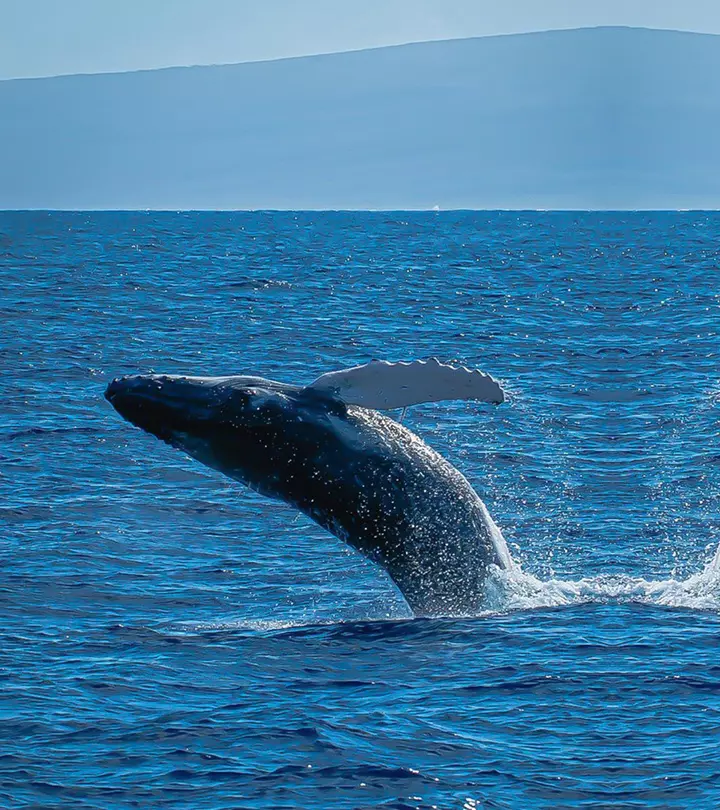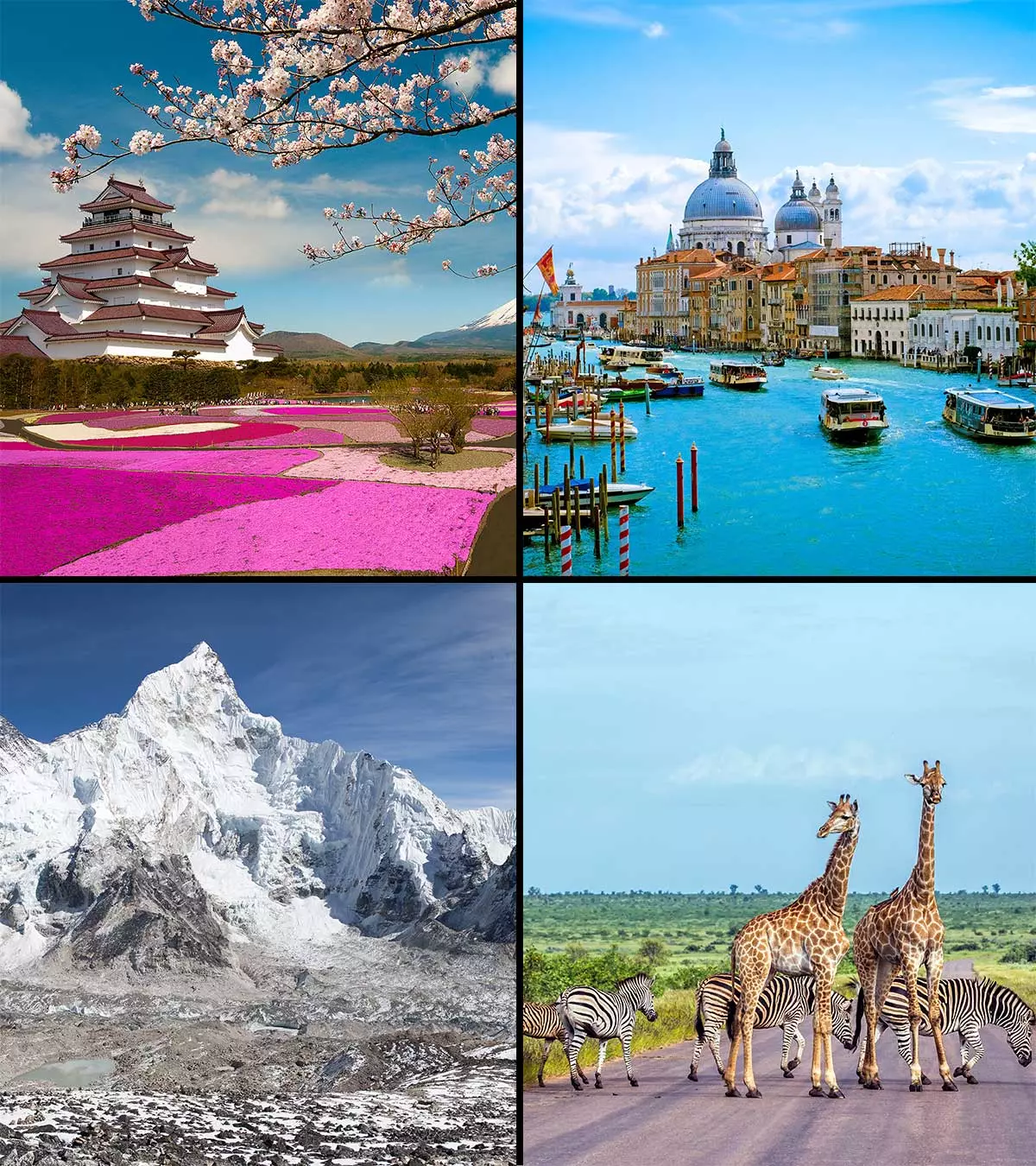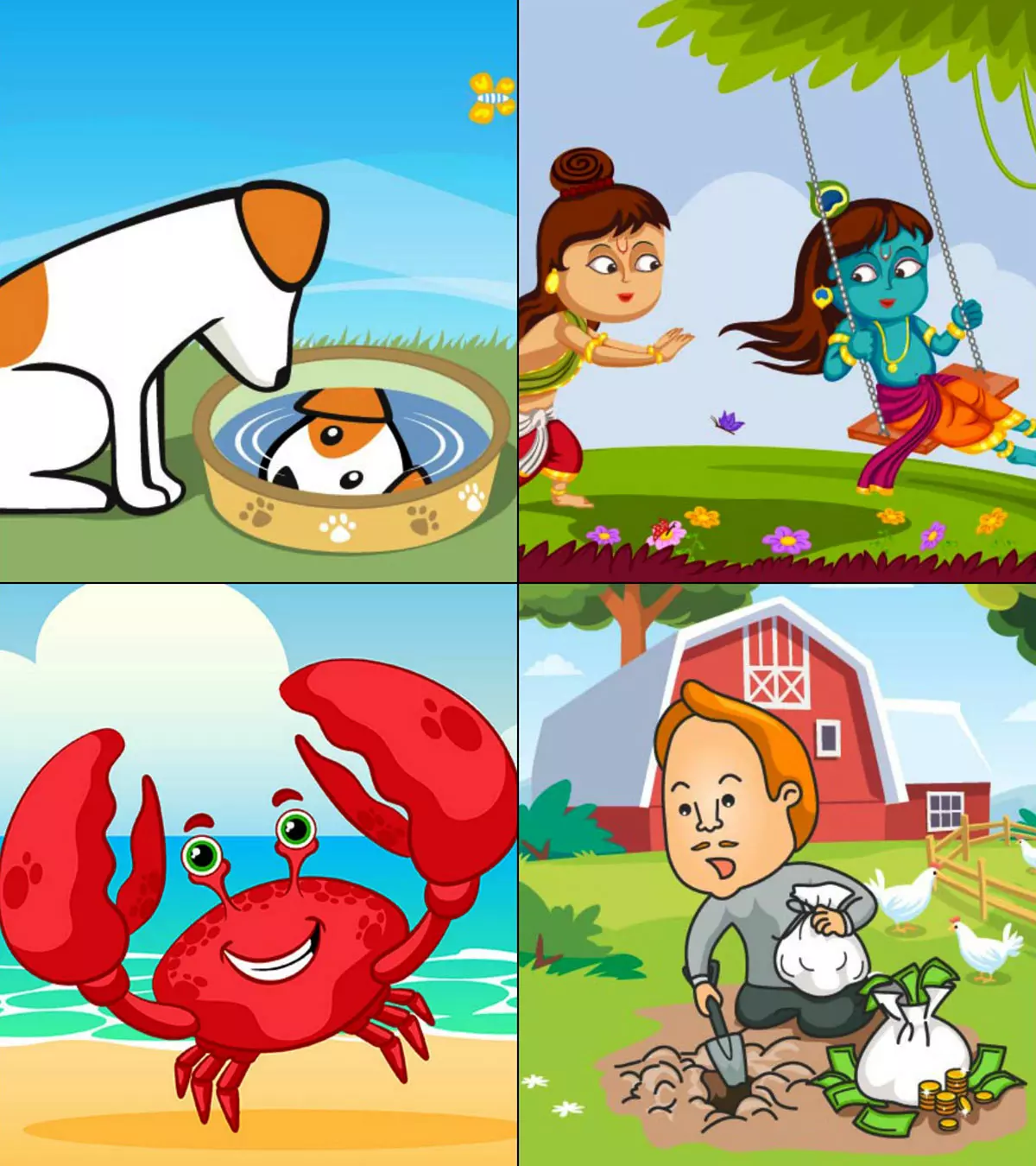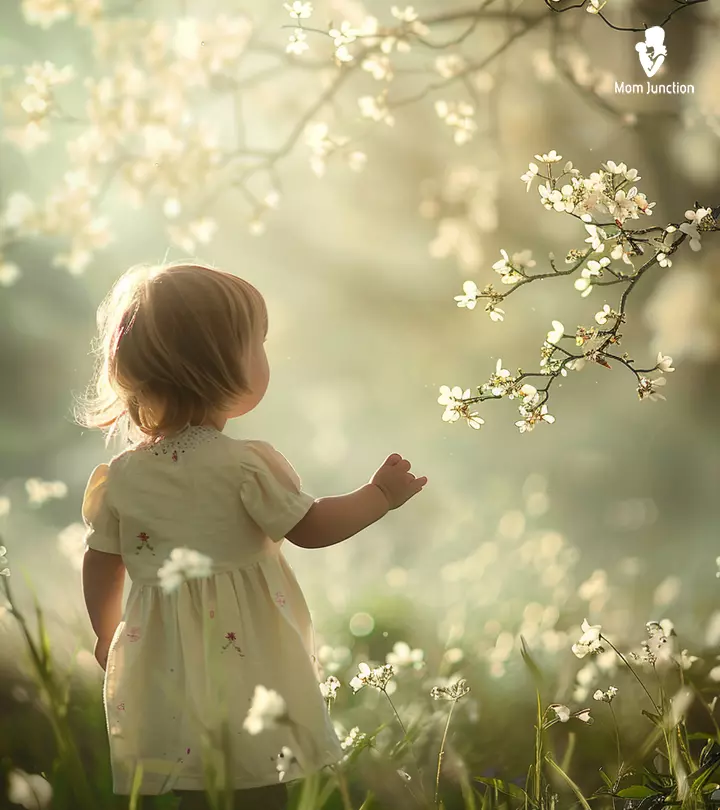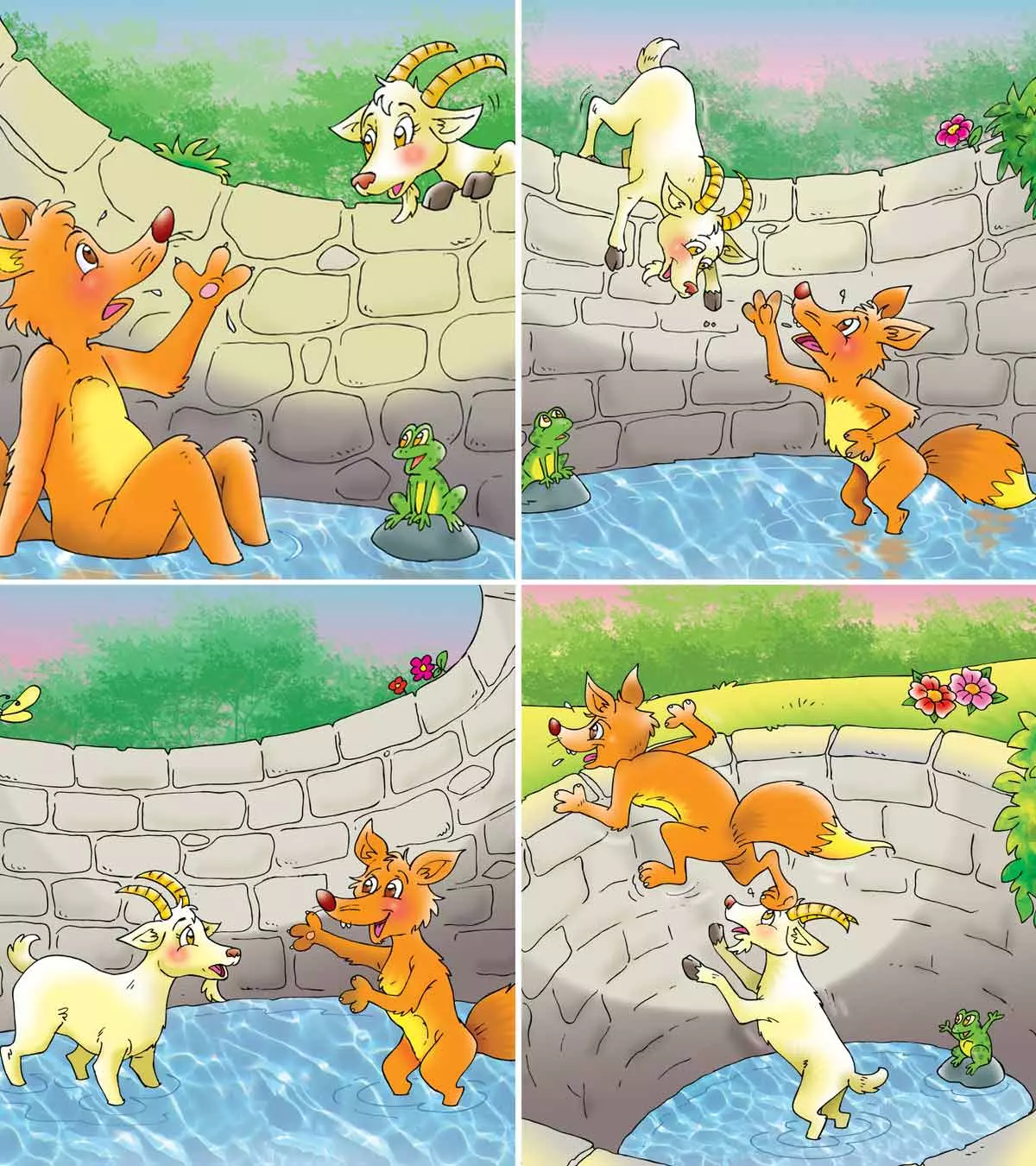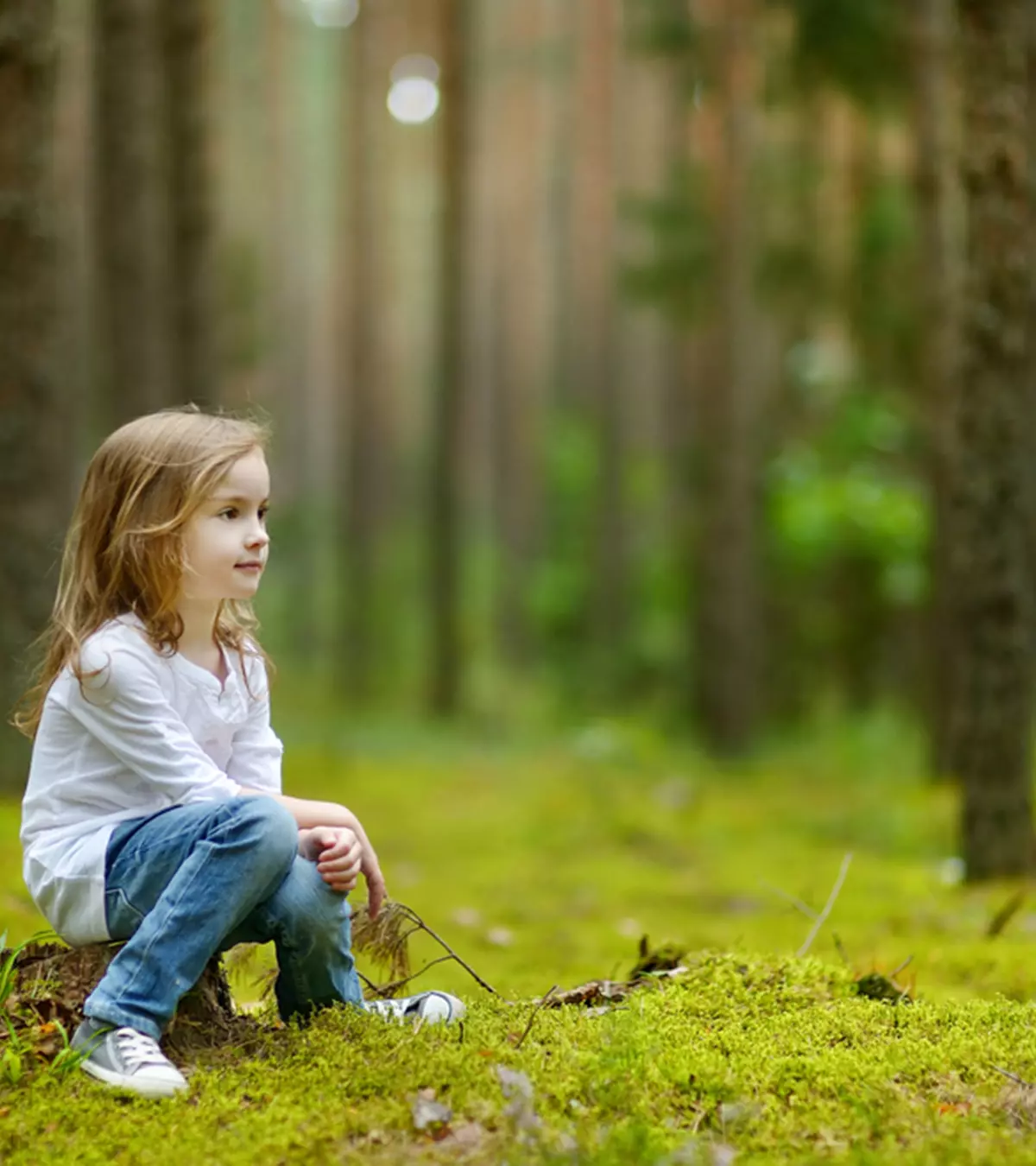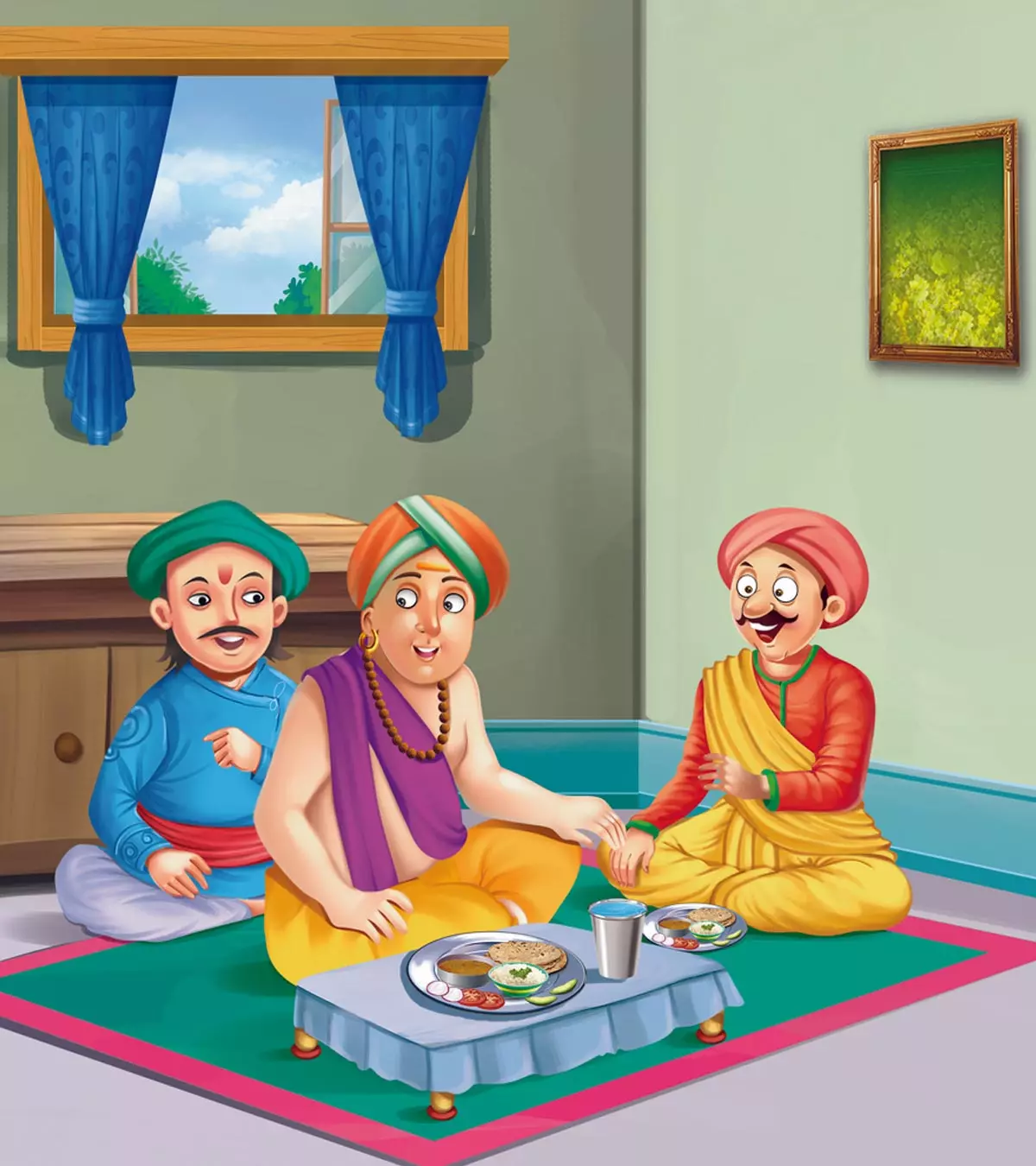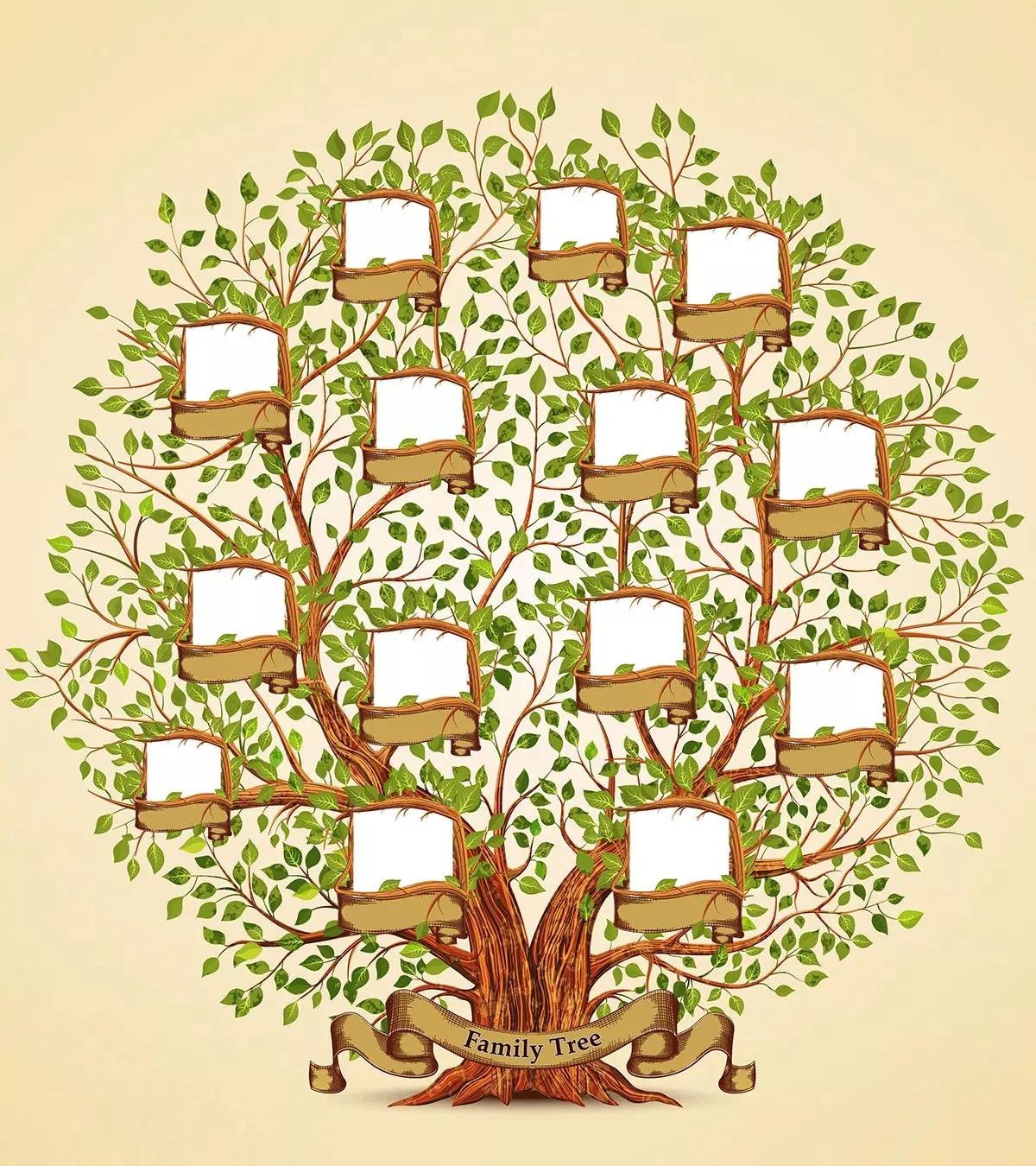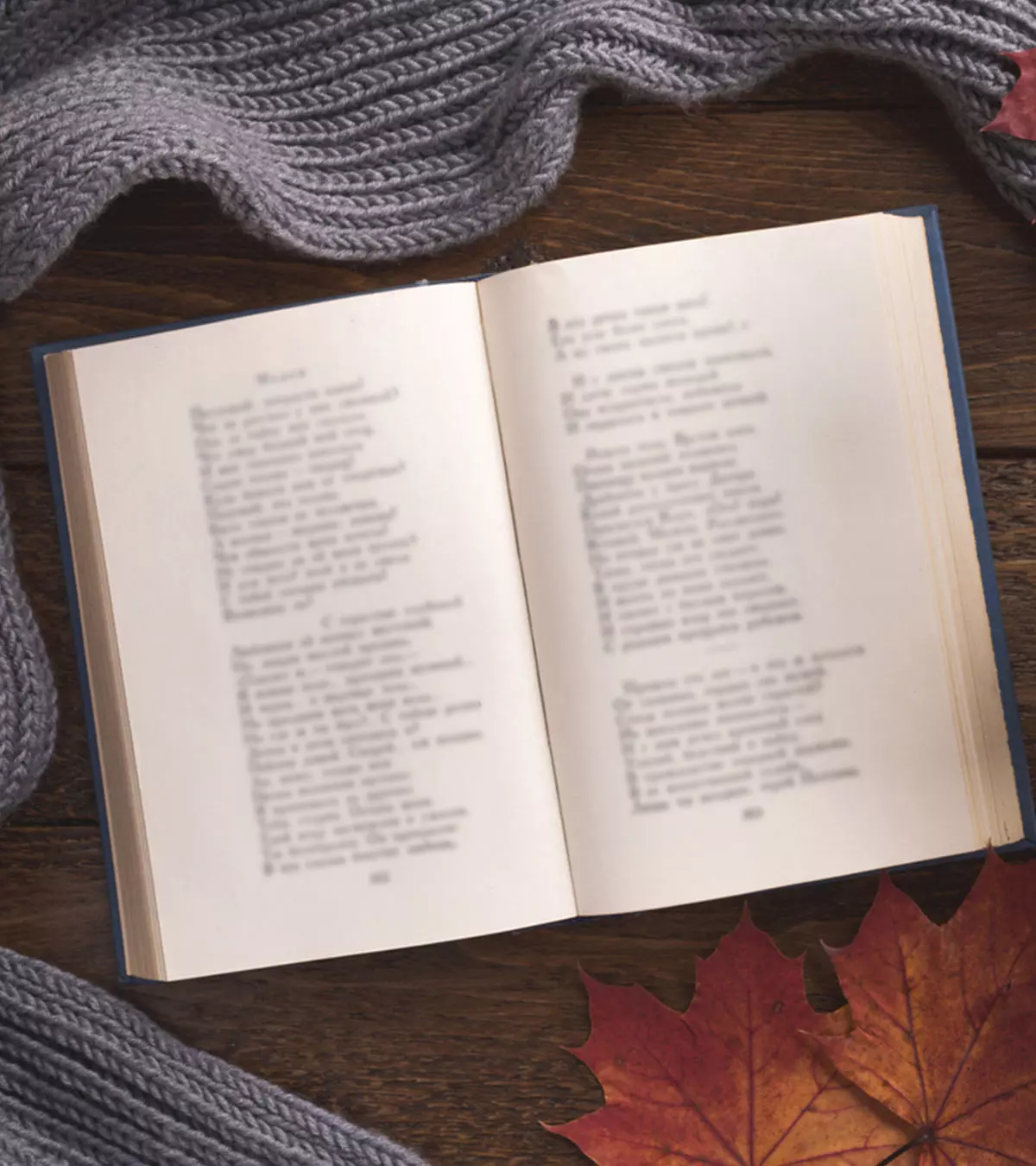
Image: ShutterStock
Autumn is a beautiful time of the year that most children love. Clear and brighter sky, soothing sun rays, and cool breeze whispers a natural song that fills you with joy. Our collection of euphonious autumn poems for kids describe the beauty of autumn aptly. Read these poems and share them with your children to teach them about this pleasant and peaceful season. Keep seasonal recipes on the table to win children’s hearts. Sit with your child, and read these fall poems to make the season more memorable. It will also help you introduce your child to renowned poets. You could also inspire them to write a poem on autumn.

19+ Best Autumn Poems For Kids
1.Besides the Autumn poets sing
Besides the Autumn poets sing,
A few prosaic days
A little this side of the snow
And that side of the Haze —
A few incisive mornings —
A few Ascetic eves —
Gone – Mr Bryant’s “Golden Rod” —
And Mr Thomson’s “sheaves.”
Still, is the bustle in the brook —
Sealed are the spicy valves —
Mesmeric fingers softly touch
The eyes of many Elves —
Perhaps a squirrel may remain —
My sentiments to share —
Grant me, Oh Lord, a sunny mind —
Thy windy will to bear!
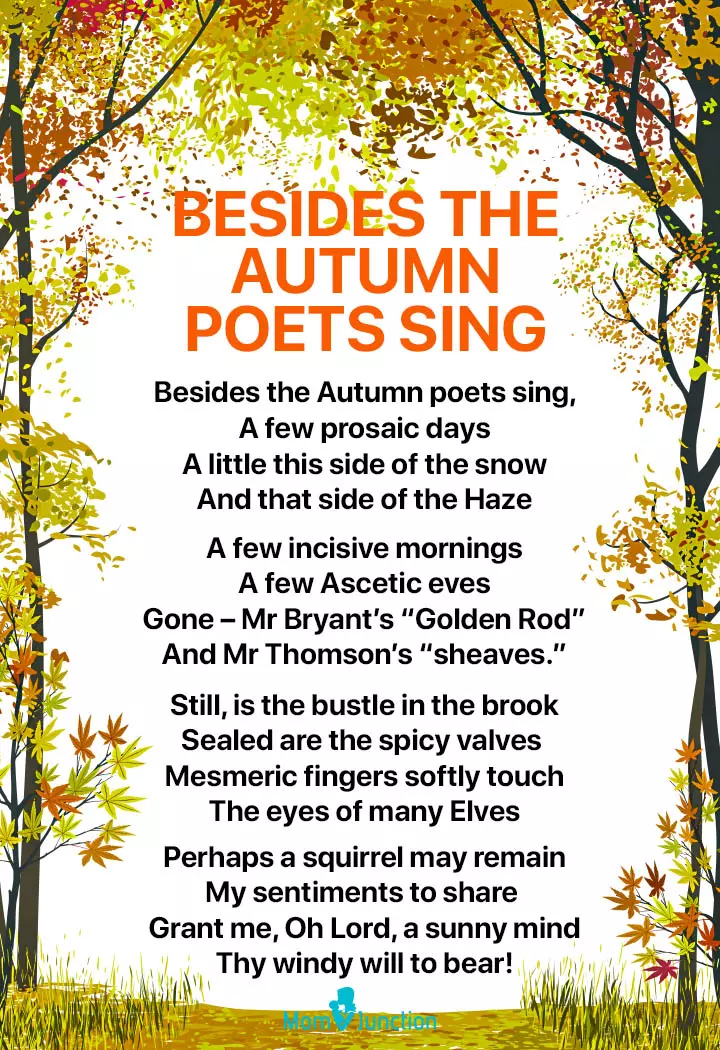
Author biography: Emily Dickinson (1830–86) was born in Amherst, Massachusetts. She was a prolific poet who loved sending poems in letters to friends and family. Her first volume of poems was published posthumously in 1890.
2. October
O hushed October morning mild,
Thy leaves have ripened to the fall;
To-morrow’s wind, if it be wild,
Should waste them all.
The crows above the forest call;
To-morrow they may form and go.
O hushed October morning mild,
Begin the hours of this day slow,
Make the day seem to us less brief.
Hearts not averse to being beguiled,
Beguile us in the way you know;
Release one leaf at break of day;
At noon release another leaf;
One from our trees, one far away;
Retard the sun with gentle mist;
Enchant the land with amethyst.
Slow, slow!
For the grapes’ sake, if they were all,
Whose leaves already are burnt with frost,
Whose clustered fruit must else be lost—
For the grapes’ sake along the wall.
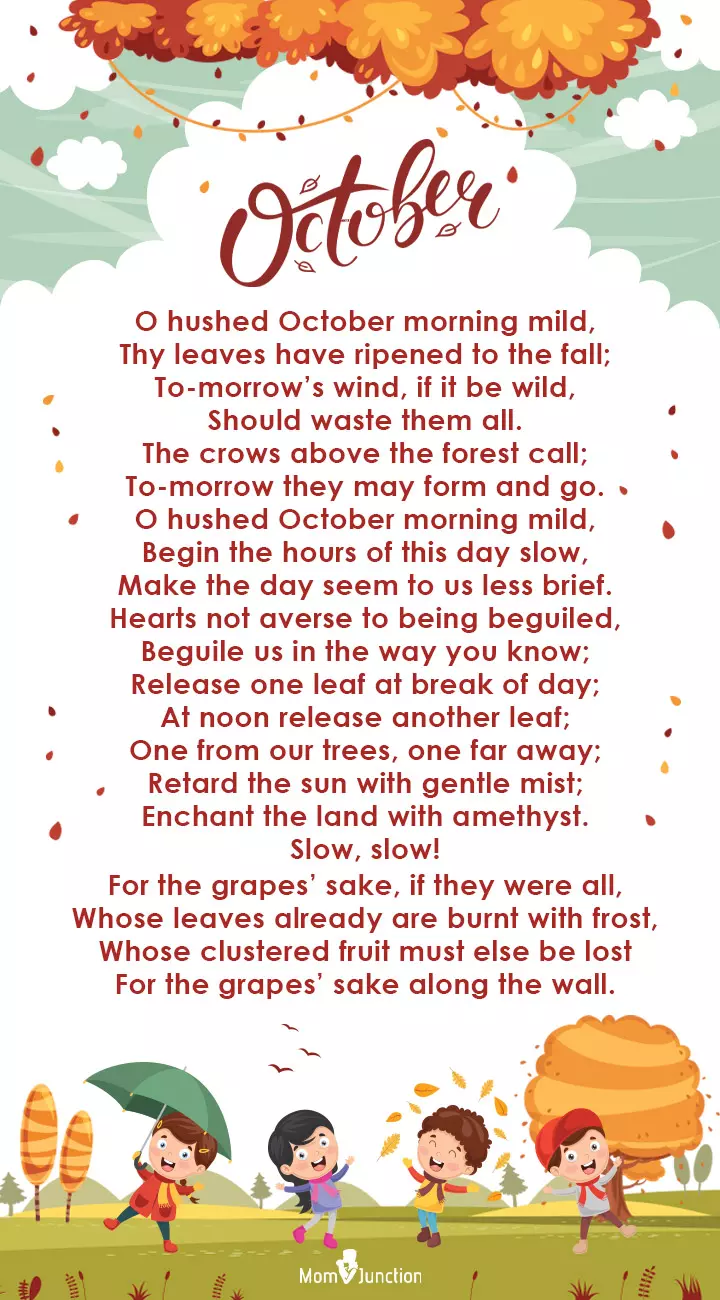
Author biography: Robert Frost (1874–1963) is one of the most popular American poets and is known for publishing several poetry collections. He was born in San Francisco. He is the only poet to receive four Pulitzer Prizes for Poetry.
3. Blackberry Eating
I love to go out in late September
among the fat, overripe, icy, black blackberries
to eat blackberries for breakfast,
the stalks very prickly, a penalty
they earn for knowing the black art
of blackberry-making; and as I stand among them
lifting the stalks to my mouth, the ripest berries
fall almost unbidden to my tongue,
as words sometimes do, certain peculiar words
like strengths or squinched,
many-lettered, one-syllabled lumps,
which I squeeze, squinch open, and splurge well
in the silent, startled, icy, black language
of blackberry-eating in late September.
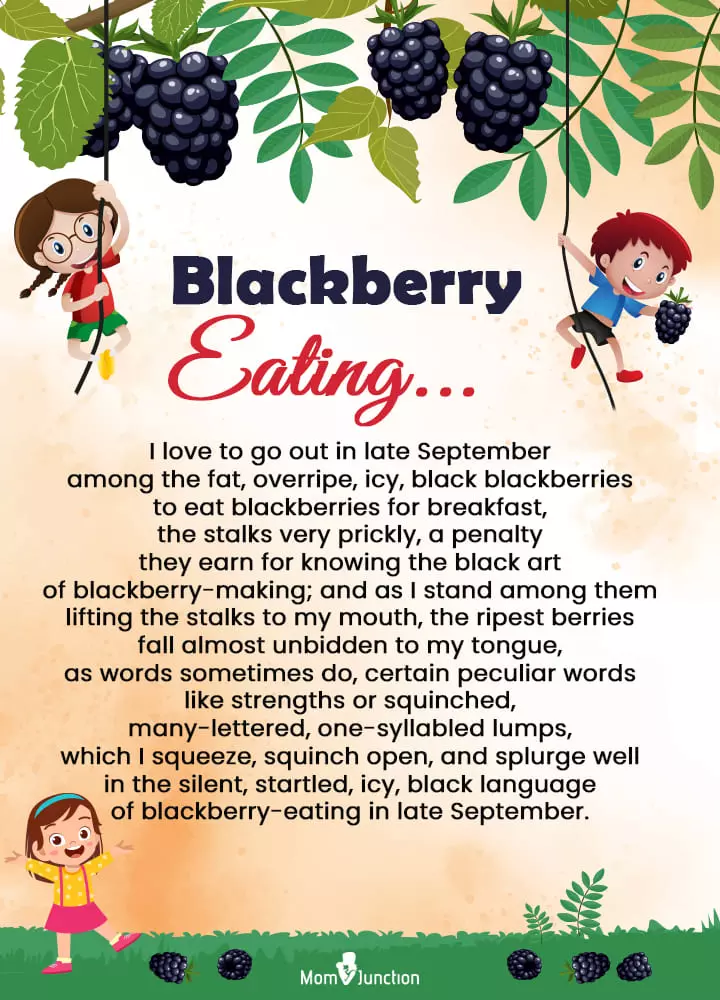
Author biography: Galway Kinnell (1927–2014) was born in Providence, Rhode Island. He was a recipient of the Pulitzer Prize and the Wallace Stevens Award for proven mastery in the art of poetry.
4.O Autumn, Autumn!
O Autumn, Autumn! O pensive light
and wistful sound
Gold-haunted sky, green-haunted ground!
When, wan, the dead leaves flutter by
Deserted realms of butterfly!
When robins band themselves together
To seek the sound of sun-steeped weather;
And all of summer’s largesse goes
For lands of olive and the rose!
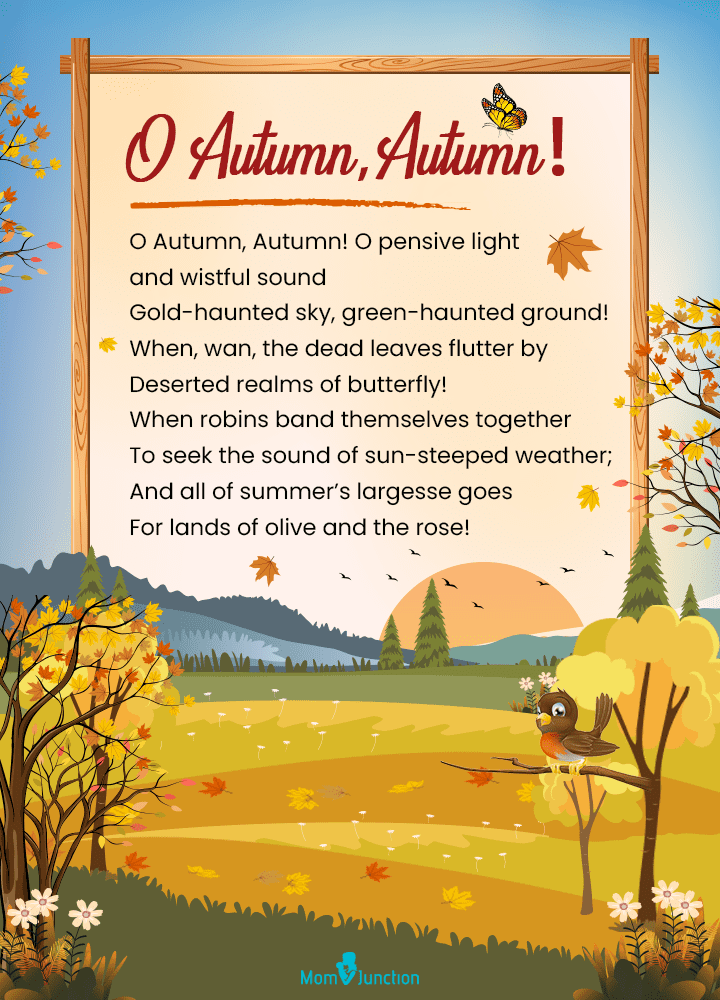
Author biography: Effie Lee Newsome (1885–1979) was born in Philadelphia, Pennsylvania. She was one of the first African American poets to publish poems for children. She served as the children’s librarian at Central State University, Ohio.
5. Autumn
In the dreamy silence
Of the afternoon, a
Cloth of gold is woven
Over wood and prairie;
And the jaybird, newly
Fallen from the heaven,
Scatters cordial greetings,
And the air is filled with
Scarlet leaves, that, dropping,
Rise again, as ever,
With a useless sigh for
Rest—and it is Autumn.

Author biography: Alexander Posey (1873–1908) was a Muskogee Creek poet, journalist, and humorist. Alexander was popularly known for his poems, which were posthumously published by his wife in 1910.
6. From The Kitten And Falling Leaves
See the kitten on the wall, sporting with the leaves that fall,
Withered leaves—one—two—and three, from the lofty elder-tree!
Through the calm and frosty air, of this morning bright and fair . . .
—But the kitten, how she starts; Crouches, stretches, paws, and darts!
First at one, and then its fellow, just as light and just as yellow;
There are many now—now one—now they stop and there are none;
What intenseness of desire, in her upward eye of fire!
With a tiger-leap half way, now she meets the coming prey,
Lets it go as fast, and then, has it in her power again:
Now she works with three or four, like an Indian Conjuror;
Quick as he in feats of art, far beyond in joy of heart.
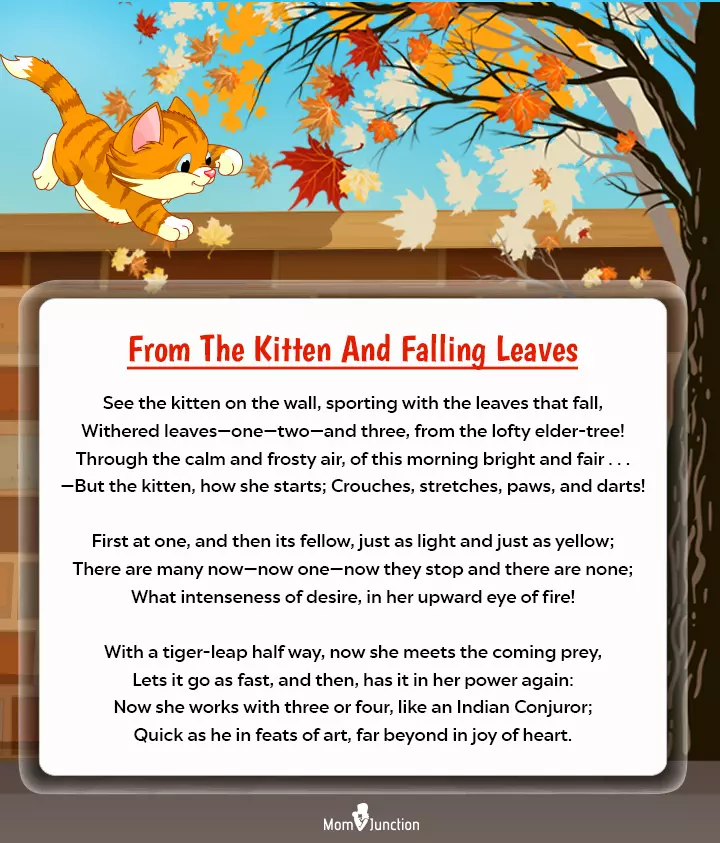
Author biography: William Wordsworth (1770–1850) was born in the United Kingdom. He was an English poet who introduced the Romantic Age in English literature.
7. The Wild Swans At Coole
The trees are in their autumn beauty,
The woodland paths are dry,
Under the October twilight the water
Mirrors a still sky;
Upon the brimming water among the stones
Are nine and fifty swans.
The nineteenth Autumn has come upon me
Since I first made my count;
I saw, before I had well finished,
All suddenly mount
And scatter wheeling in great broken rings
Upon their clamorous wings.
I have looked upon those brilliant creatures,
And now my heart is sore.
All’s changed since I, hearing at twilight,
The first time on this shore,
The bell-beat of their wings above my head,
Trod with a lighter tread.
Unwearied still, lover by lover,
They paddle in the cold,
Companionable streams or climb the air;
Their hearts have not grown old;
Passion or conquest, wander where they will,
Attend upon them still.
But now they drift on the still water
Mysterious, beautiful;
Among what rushes will they build,
By what lake’s edge or pool
Delight men’s eyes, when I awake some day
To find they have flown away?
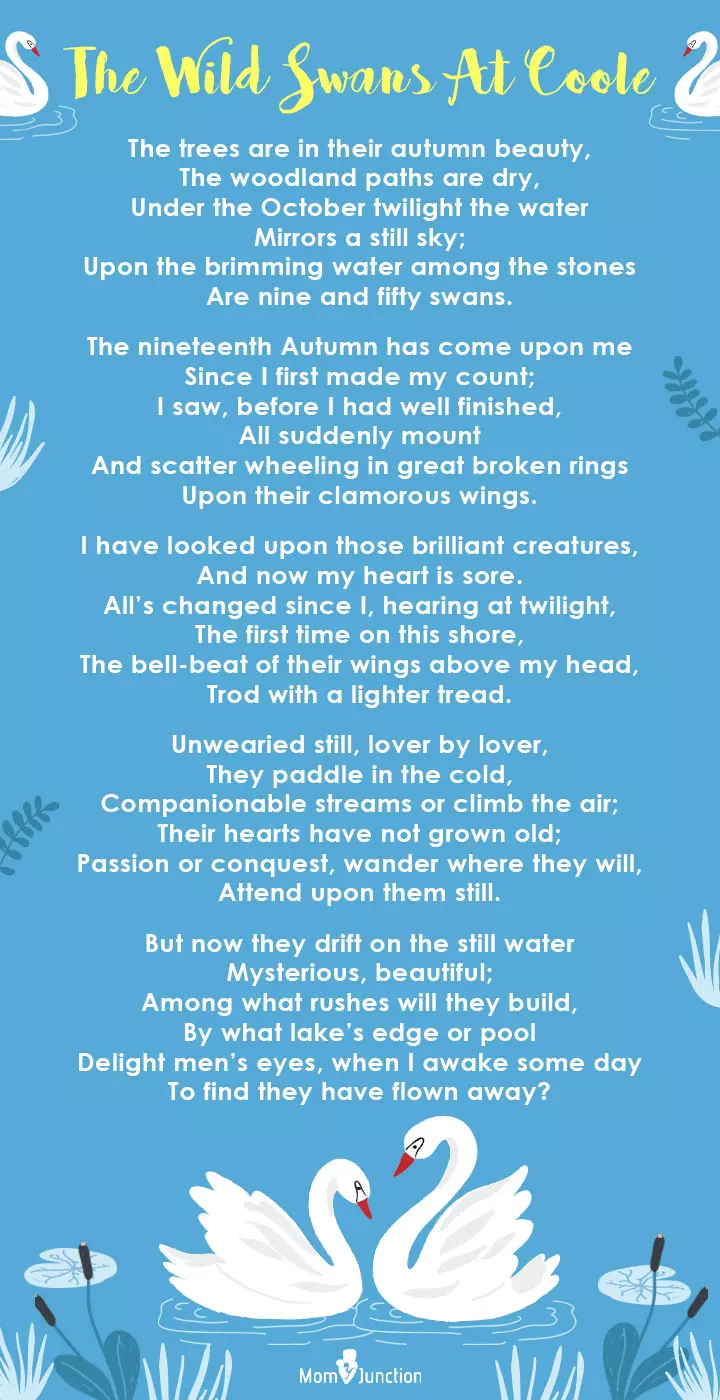
Author biography: William Butler Yeats (1865–1939) is widely known as one of the greatest poets of the English language. He received the 1923 Nobel Prize for Literature. His works greatly influenced the politics and heritage of Ireland.
8. November
November’s days are thirty:
November’s earth is dirty,
Those thirty days, from first to last;
And the prettiest thing on ground are the paths
With morning and evening hobnails dinted,
With foot and wing-tip overprinted
Or separately charactered,
Of little beast and little bird.
The fields are mashed by sheep, the roads
Make the worst going, the best the woods
Where dead leaves upward and downward scatter.
Few care for the mixture of earth and water,
Twig, leaf, flint, thorn,
Straw, feather, all that men scorn,
Pounded up and sodden by flood,
Condemned as mud.
But of all the months when earth is greener
Not one has clean skies that are cleaner.
Clean and clear and sweet and cold,
They shine above the earth so old,
While the after-tempest cloud
Sails over in silence though winds are loud,
Till the full moon in the east
Looks at the planet in the west
And earth is silent as it is black,
Yet not unhappy for its lack.
Up from the dirty earth men stare:
One imagines a refuge there
Above the mud, in the pure bright
Of the cloudless heavenly light:
Another loves earth and November more dearly
Because without them, he sees clearly,
The sky would be nothing more to his eye
Than he, in any case, is to the sky;
He loves even the mud whose dyes
Renounce all brightness to the skies.

Author biography: Philip Edward Thomas (1878–1917) was born in London. He was a close friend of the famous poet Robert Frost. He wrote most of his poems while serving as a soldier during World War I, and was killed in the war in France.
9. Sonnet 73: That time of year thou mayst in me behold
That time of year thou mayst in me behold
When yellow leaves, or none, or few, do hang
Upon those boughs which shake against the cold,
Bare ruin’d choirs where late the sweet birds sang.
In me thou seest the twilight of such day
As after sunset fadeth in the west,
Which by and by black night doth take away,
Death’s second self, that seals up all in rest.
In me thou seest the glowing of such fire
That on the ashes of his youth doth lie,
As the death-bed whereon it must expire,
Consum’d by that which it was nourished by.
This thou perceiv’st which makes thy love more strong,
To love that well which thou must leave ere long.
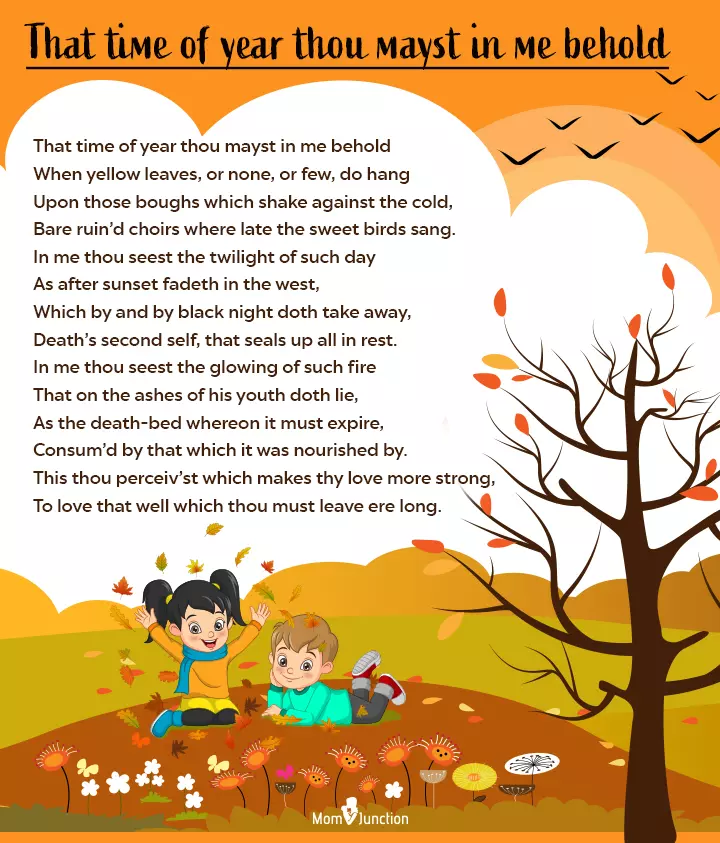
Author biography: William Shakespeare (1564–1616) was born in Stratford-upon-Avon, United Kingdom. He is a legendary poet and actor, and is widely recognized as the greatest writer in the English language.
 Trivia
Trivia10. Autumn Fires
In the other gardens
And all up in the vale,
From the autumn bonfires
See the smoke trail!
Pleasant summer over,
And all the summer flowers,
The red fire blazes,
The grey smoke towers.
Sing a song of seasons!
Something bright in all!
Flowers in the summer,
Fires in the fall!

Author biography: Robert Louis Stevenson (1850–1894) was born in Edinburgh, United Kingdom. He was a famous Scottish novelist, poet, and travel writer. Some of his popular works include Treasure Island, Kidnapped, Strange Case of Dr Jekyll and Mr Hyde, and A Child’s Garden of Verses.
11. Pleasant Sounds
The rustling of leaves under the feet in woods and under
hedges;
The crumpling of cat-ice and snow down wood-rides,
narrow lanes and every street causeway;
Rustling through a wood or rather rushing, while the wind
halloos in the oak-toop like thunder;
The rustle of birds’ wings startled from their nests or flying
unseen into the bushes;
The whizzing of larger birds overhead in a wood, such as
crows, puddocks, buzzards;
The trample of robins and woodlarks on the brown leaves.
and the patter of squirrels on the green moss;
The fall of an acorn on the ground, the pattering of nuts on
the hazel branches as they fall from ripeness;
The flirt of the groundlark’s wing from the stubbles –
how sweet such pictures on dewy mornings, when the
dew flashes from its brown feathers.

Author biography: John Clare (1793–1864) was born in Helpstone, United Kingdom. He was born to a farmer’s family and is known for celebrating the English countryside in his poems.
12. Autumn, Queen of Year
When the pumpkins are so yellow
And the vines with grapes abound,
When the melons are so mellow
And the nuts fall to the ground;
When persimmons lose their bitters,
And the apples are so red;
When we love to eat corn fritters
Since the roasting ears have fled;
When vacation days are over
And the children go to school,
They no longer play in clover,
But much learn “Arithmos-rule,”
When weird Hallowe’en’s most naughty elves
With gnomes and sprites appear,
While fat Thanksgiving fills the shelves –
‘Tis AUTUMN, QUEEN OF YEAR.
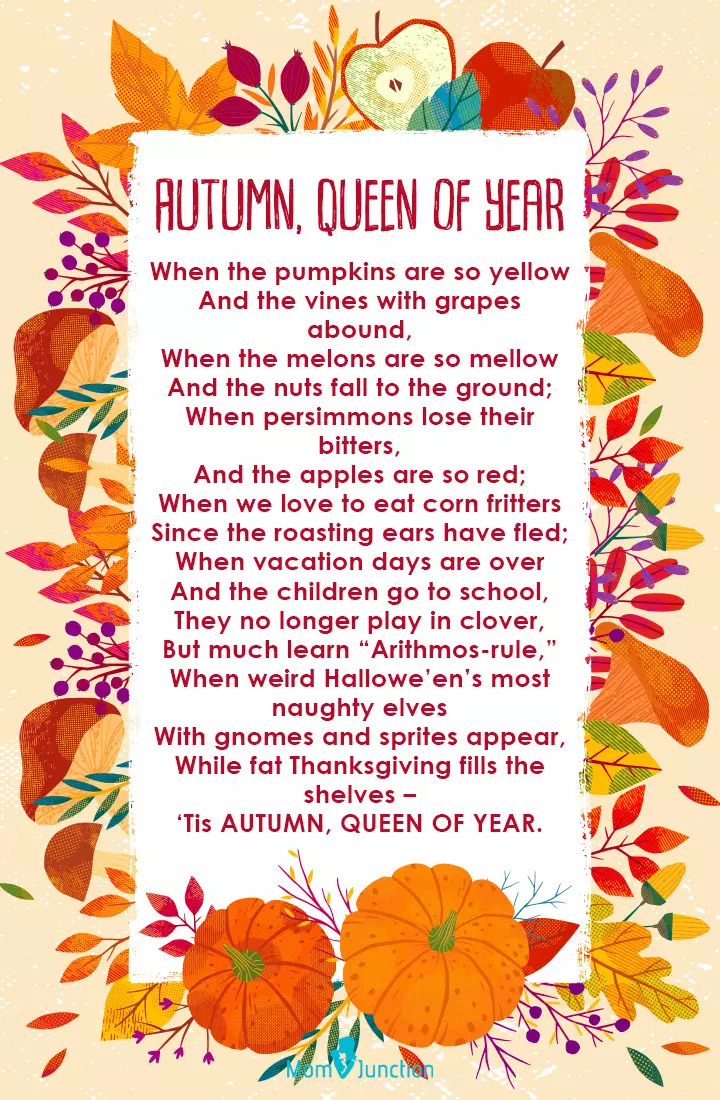
Author biography: Winifred Sackville Stoner, Jr. (1902–1983) was born in Evansville, Indiana. She had an illustrated book of her poems published when she was just six years old and was known for speaking more than five languages.
13. Plums
When their time comes they fall
without wind, without rain.
They seep through the trees’ muslin
in a slow fermentation.
Daily the low sun warms them
in a late love that is sweeter
than summer. In bed at night
we hear heartbeat of fruitfall.
The secretive slugs crawl home
to the burst honeys, are found
in the morning mouth on mouth,
inseparable.
We spread patchwork counterpanes
for a clean catch. Baskets fill,
never before such harvest,
such a hunters’ moon burning
the hawthorns, drunk on syrups
that are richer by night
when spiders pitch
tents in the wet grass.
This morning the red sun
is opening like a rose
on our white wall, prints there
the fishbone shadow of a fern.
The early blackbirds fly
guilty from a dawn haul
of fallen fruit. We too
breakfast on sweetnesses.
Soon plum trees will be bone,
grown delicate with frost’s
formalities. Their black
angles will tear the snow.
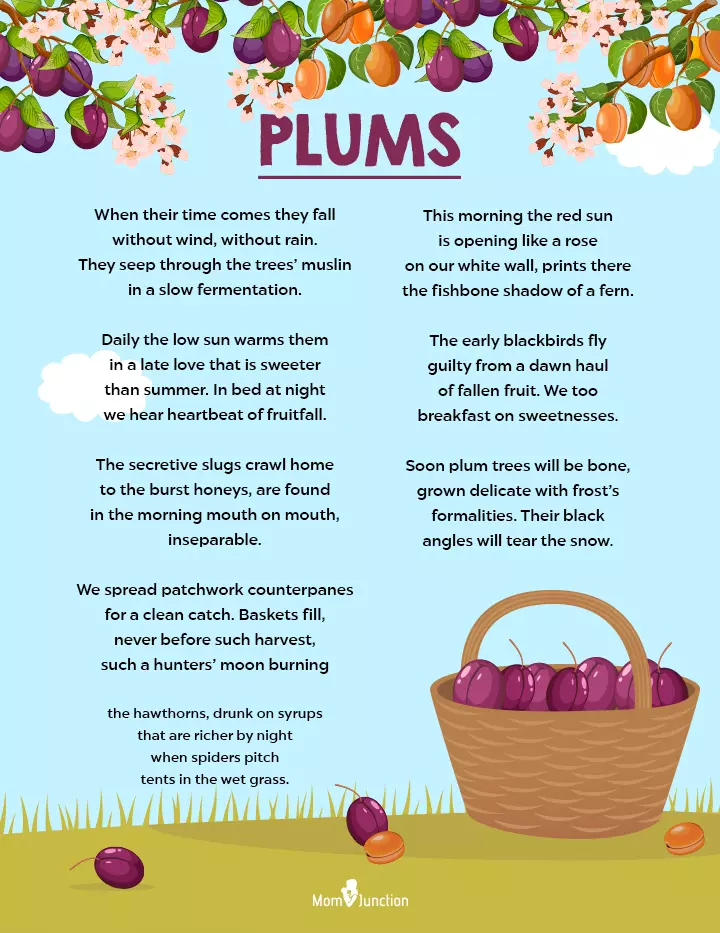
Author biography: Gillian Clarke (b. 1937) is a Welsh poet and playwright. She has received the prestigious Cholmondeley Award and the Queen’s Gold Medal for Poetry award for her excellence in poetry.
14. From Sunset To Star Rise
Go from me, summer friends, and tarry not:
I am no summer friend, but wintry cold,
A silly sheep benighted from the fold,
A sluggard with a thorn-choked garden plot.
Take counsel, sever from my lot your lot,
Dwell in your pleasant places, hoard your gold;
Lest you with me should shiver on the wold,
Athirst and hungering on a barren spot…

Author biography: Christina Georgina Rossetti (1834–1894) was a devoted English poet. She published her first poems at the age of 12 and dedicated her life to writing various devotional, romantic, and children’s poems.
15. Autumn Rain
The plane leaves
fall black and wet
on the lawn;
the cloud sheaves
in heaven’s fields set
droop and are drawn
in falling seeds of rain;
the seed of heaven
on my face
falling — I hear again
like echoes even
that softly pace
heaven’s muffled floor …
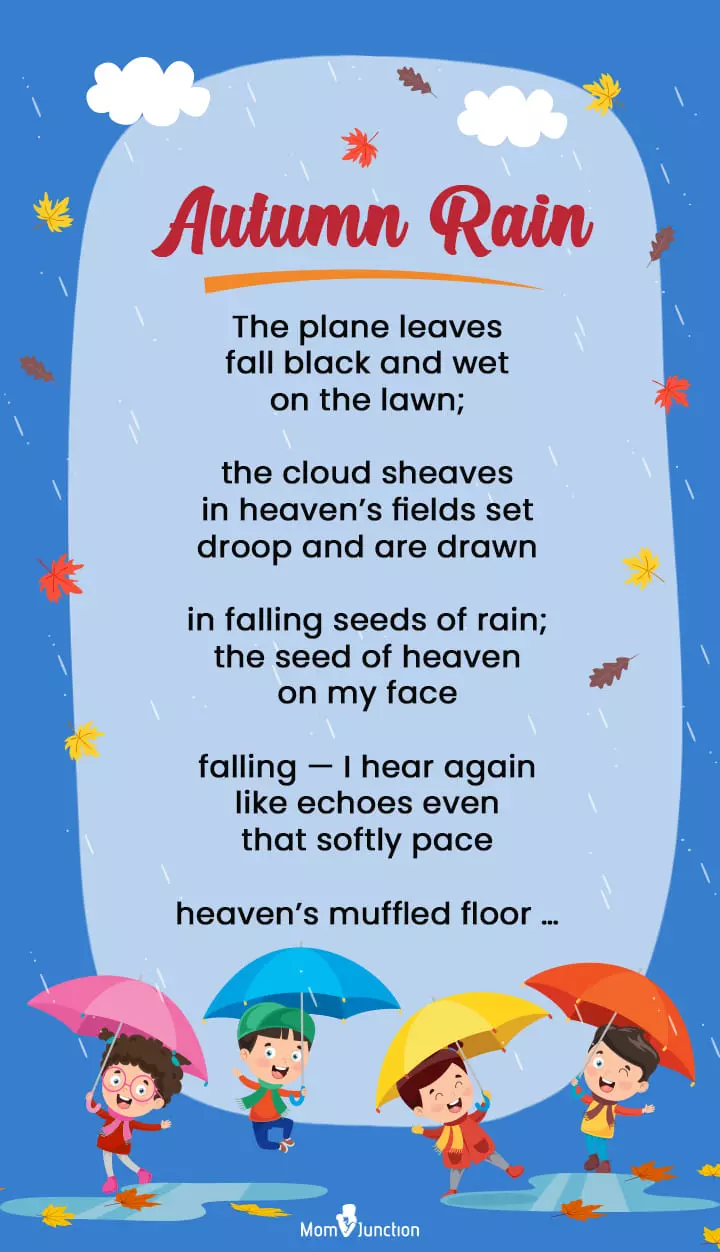
Author biography: David Herbert (D.H.) Lawrence (1885–1930) was an English poet and writer. He primarily writes about the effects of industrialization on humanity in his novels, short stories, poems, and plays.
16. The Last Leaf
A few leaves stay for a while on the trees
After their color begins to turn,
And no other leaves seem as gold as these
Not even the ones our bonfires burn
With golden flames in piles on the ground.
A few leaves stay so long that I found
The one last leaf on a tree in the snow,
And when a galloping wind came round
The edge of our house and started to blow
Snow dust to sparkles floating free.
When the wind ran away, almost with me,
And sunshine settled quiet and cold.
There, like a bird, still on the tree
Was that lonesome leaf, no longer gold
But curly and brown and dry and old.
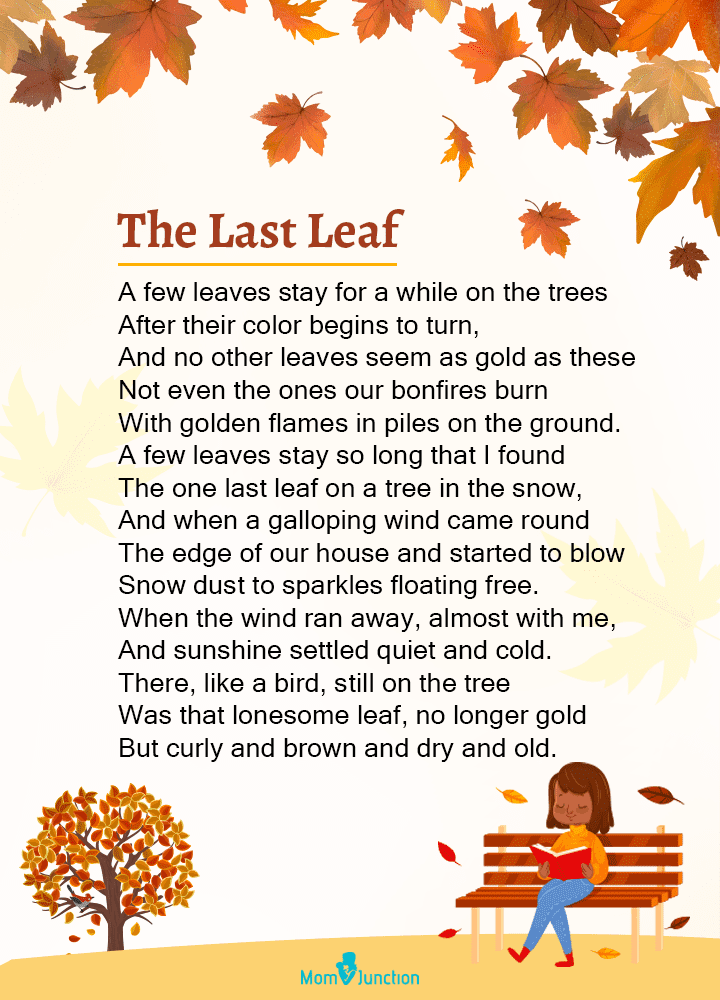
Author biography: Harry Behn (1898–1973) was a renowned American screenwriter and children’s author. It is said that he began writing children’s books at the request of his children.
17. Summer’s End
One by one the petals drop
There’s nothing that can make them stop.
You cannot beg a rose to stay.
Why does it have to be that way?
The butterflies I used to chase
Have gone off to some other place.
I don’t know where. I only know
I wish they didn’t have to go.
And all the shiny afternoons
So full of birds and big balloons
And ice cream melting in the sun Are done.
I do not want them done
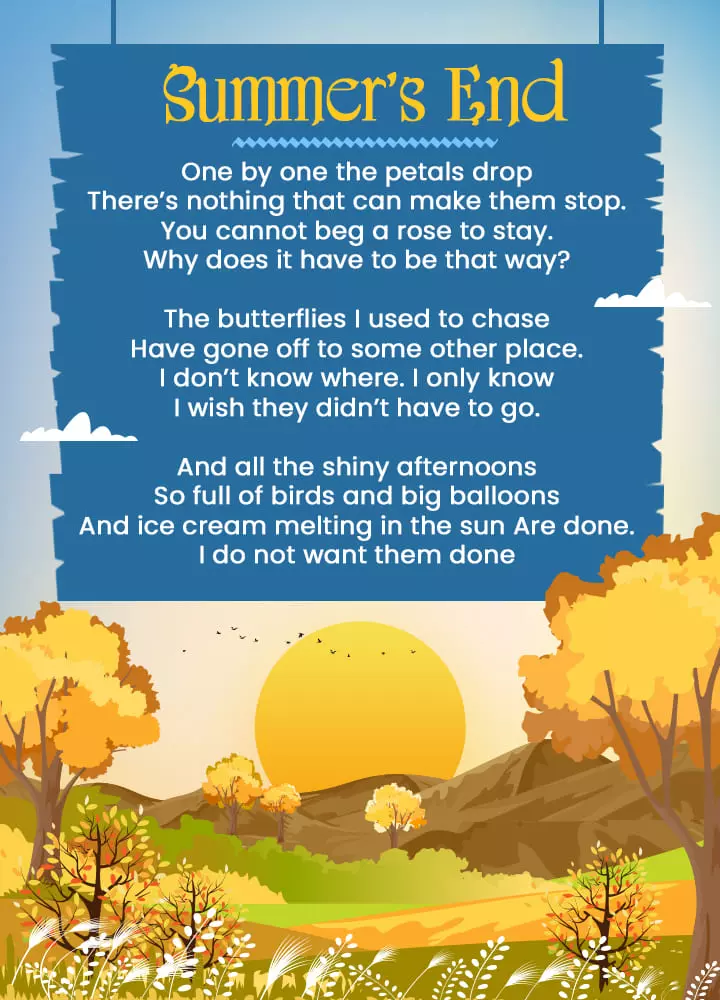
Author biography: Judith Viorst (b. 1931) is an American writer, psychoanalysis researcher, and newspaper journalist. She is recognized for her humorous poetry and writings for children. She lives in Washington, DC.
18. A Leaf
If I were a leaf
(but I wouldn’t be)
I’d have to be tied
to a tree, tree, tree.
I couldn’t walk off
(or skip or run)
and my nose would get burned
by the sun, sun, sun.
In summer I’d roast,
(in winter I’d freeze)
and all through October
I’d sneeze, sneeze, sneeze.
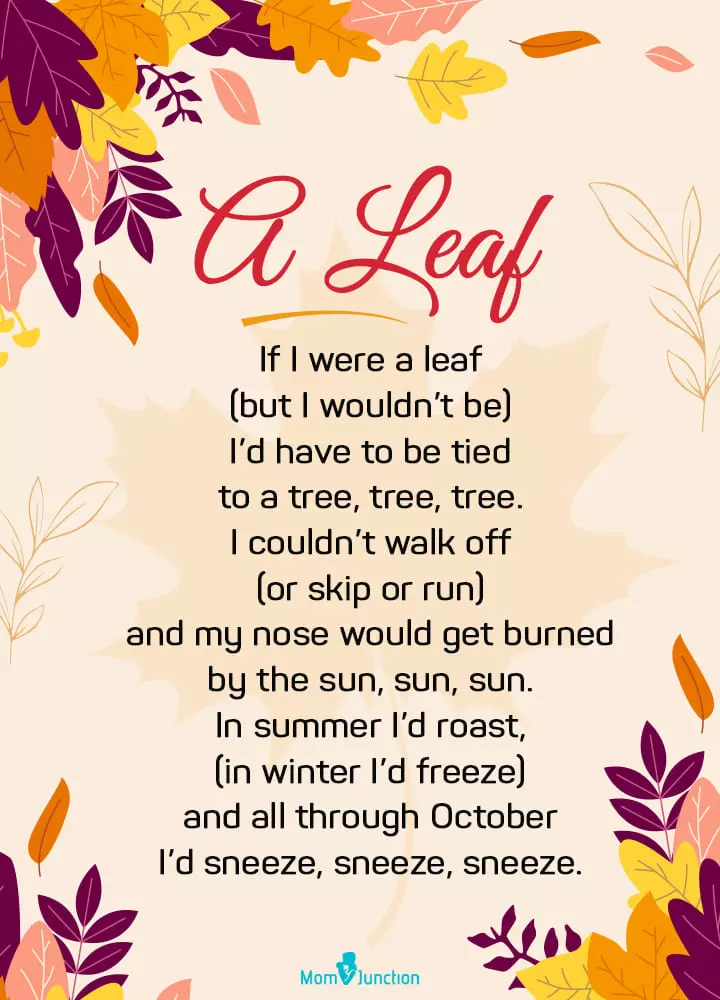
Author biography: Aileen Lucia Fisher (1906–2002) was born in Iron River, Michigan. She wrote more than a hundred children’s books, including poetry collections, picture books with verses, and biographies. She received the National Council of Teachers of English Award for Excellence in Poetry for Children in 1978.
19. Five Little Pumpkins
Five Little Pumpkins sitting on a gate,
The First one said “Oh my it’s getting late!”
The second one said “There’s a chill in the air.”
The Third one said “But we
don’t care!”
The Fourth one said “let’s
Run and Run and Run.”
The Fifth one said “I’m ready for some fun.”
Oooooooo went the wind.
and Out went the lights!
And the five little pumpkins
rolled out of sight!
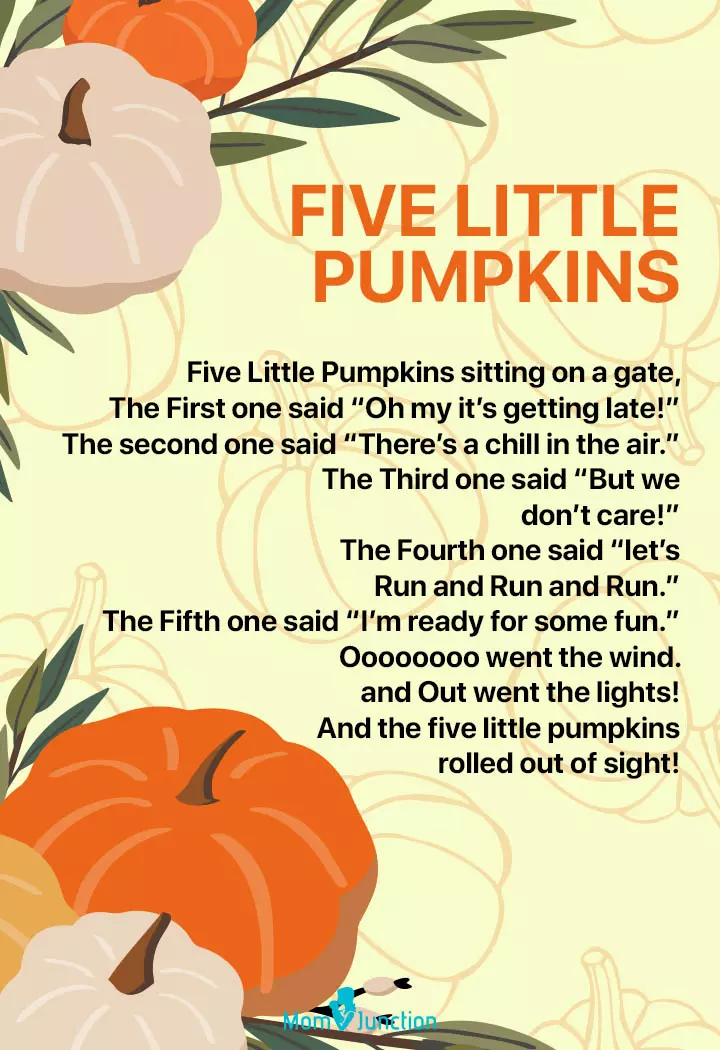
Author biography: Dan Yaccarino (b. 1965) is an American author and producer of animated series. He has written several children’s books.
 Quick tip
Quick tip20. Five Little Acorns
Five little acorns sitting in a tree
Along came Mr. Squirrel as hungry as can be.
Then the fall winds blew and rustled all the leaves.
Down came an acorn:
Mr. Squirrel was very pleased!
Four little acorns sitting in a tree
Along came Mr. Squirrel as hungry as can be.
Then the fall winds blew and rustled all the leaves.
Down came an acorn:
Mr. Squirrel was very pleased!
Three little acorns sitting in a tree
Along came Mr. Squirrel as hungry as can be.
Then the fall winds blew and rustled all the leaves.
Down came an acorn:
Mr. Squirrel was very pleased!
Author biography: Unknown
Illustration: Beautiful Autumn Poems For Kids To Fall For

Image: Stable Diffusion/MomJunction Design Team
Frequently Asked Questions
1. Can any autumn poems for children be turned into a song?
Many autumn poems can be turned into songs celebrating the Harvest Festival. Some autumn poems for children that have been turned into songs include “Autumn Fires” by Robert Louis Stevenson and “Five Little Pumpkins” by Dan Yaccarino.
2. What are some examples of rhyming words used in autumn poems for children?
Some examples of rhyming words used in autumn poems for children are dies and skies, roads and woods, yellow and mellow, and elves and shelves.
3. What is autumn, and why is it an interesting topic for children’s poems?
Autumn is the season between summer and winter, characterized by the shedding leaves from deciduous trees and the beginning of sweater and woolen season. It is an interesting topic for children’s poems because it symbolizes abundance and transition.
4. How can reading and writing autumn poems help children develop their language skills?
Reading and writing autumn poems can help children expand their vocabulary and learn new literary devices such as metaphors, similes, and rhyming words. It also lets them practice their grammar and sentence structure, improving their reading and writing comprehension.
5. How can reading autumn poems for children help children appreciate nature and the changing seasons?
Reading autumn poems can help children appreciate nature and the changing seasons by encouraging them to pay attention to the world around them and notice its subtle changes.
6. How can children write their own autumn poems?
Children can make a list of words and phrases that describes the season. They can start by reading and studying the structure and content of other autumn poems. They can practice writing autumn poems and experiment with different styles of writing. Writing could be more fun if you use creativity and imagination. A teacher, Stephanie helped her students make a poet tree where the children would paint a tree with leaves depicting the autumn season and write poems on the leaves. She says, “I really love how creative and imaginative the students were with this project. Since the theme was so universal for them, all of the students were able to be successful. I also was able to see who really understood the meter and rhyme scheme through the trees. Plus, our Poet-Tree Forest makes an awesome display (i)!”
Autumn is a beautiful season when the trees change color, and the weather is neither too hot nor cold. You get to spend some quality time outdoors, usually with a rake, collecting fallen leaves and unwinding in the lap of nature by going on a hayride in search of seasonal fruits and vegetables like pumpkins and apples. The fall was a subject or setting for many renowned English poems for kids. So take your child out on a picnic and read these poems about autumn for kids. You can also read these fall poems for kids while they work on fall coloring pages or during their bedtime to awaken their imagination. This will also help you cultivate a love of poetry in your child from a young age.
Key Pointers
- Autumn is a season cherished by children due to its clear skies, warm sunlight, and refreshing breeze.
- The fall season provides an excellent opportunity for outdoor activities, such as collecting fallen leaves and enjoying hayrides while enjoying seasonal fruits and vegetables.
- Parents can engage with their children by reading these autumn poems together, making the season more memorable and fostering a deeper connection.
- Introducing children to poetry at a young age can help develop a lifelong love for literature, allowing them to explore their creativity through writing poems about autumn.
Experience the magic of autumn through a delightful poem tailored for kids. Dive into the vibrant colors and cozy moments of the autumn season, beautifully captured in this heartwarming video.
Personal Experience: Source
MomJunction articles include first-hand experiences to provide you with better insights through real-life narratives. Here are the sources of personal accounts referenced in this article.
i. Fall poet-trees — Poetry writing unit for fall;https://www.teachinginroom6.com/2012/09/fall-poet-trees.html?m=0
Community Experiences
Join the conversation and become a part of our nurturing community! Share your stories, experiences, and insights to connect with fellow parents.
Read full bio of Beth Sullivan
Read full bio of Shivank Joshi
Read full bio of Harshita Makvana




